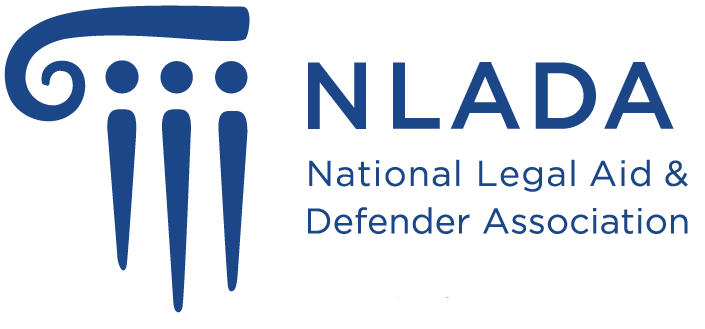Washington (September 12, 2023) – The National Legal Aid & Defender Association, American Council of Chief Defenders, and Black Public Defender Association released the following joint statement in response to the release of the new National Public Defense Workload Study. NLADA members participated in the study as part of the expert panel:
As a key partner in supporting quality defense across the country, we are calling on state and local governments nationwide to reduce overwhelming public defender workloads, invest resources into the holistic approach to public defense, and deliver on the constitutional right to counsel.
The implementation of these workload standards will result in the realization of quality representation for the clients of public defenders including Black, Brown, and Indigenous communities who are targeted by our country's criminal legal systems. These standards will bring us a significant step closer to achieving the promise of Justice for All.
Reasonable workload limits are a necessary condition for any public defender to provide adequate representation to their clients, but jurisdictions implementing these limits must also be mindful of other important factors that affect the quality of defense. These include, most importantly, consideration of the lived experiences of the clients who interact with, and receive services from, public defender offices.
The new “National Public Defense Workload Study” is a collaboration between RAND Corporation; the National Center for State Courts (NCSC); the American Bar Association (ABA) Standing Committee on Legal Aid and Indigent Defense (ABA SCLAID); and Stephen F. Hanlon, Principal, Law Office of Lawyer Hanlon; and funded by Arnold Ventures.
The National Public Defense Workload Study updates the 50-year-old National Advisory Commission on Criminal Justice Standards and Goals (NAC) standards for public defense caseloads—which were also developed in collaboration with NLADA consultants—to account for the time needed to provide adequate representation in various case types while also considering the more time-intensive nature of current-day criminal defense representation. In 2023, public defenders' workloads have changed to include time to review police body camera footage, social media accounts, cell phone records, and other voluminous evidence.
The new study significantly reduces the maximum recommended caseloads. Many jurisdictions that still use the 1973 standards to determine workloads have stretched their public defenders too thin to the detriment of clients, their families, and the broader community. For state and local governments to uphold the Sixth Amendment right to counsel, we must adequately fund public defense to allow for reasonable workloads and adequate representation in every case.
For more information about this statement or to interview an NLADA subject matter expert, please contact Rabiah Alicia Burks at [email protected].
###
The National Legal Aid & Defender Association (NLADA), founded in 1911, is America's oldest and largest nonprofit association devoted to excellence in the delivery of legal services to those who cannot afford counsel. NLADA has pioneered access to justice at the national, state and local levels, playing a leadership role in the creation of public defender systems and other important institutions from The Sentencing Project to the Legal Services Corporation. A leader in the development of national standards for civil legal aid and public defense, NLADA also provides advocacy, training, and technical assistance for equal justice advocates across the country.
The American Council of Chief Defenders (ACCD) is a national community of public defense leaders dedicated to securing a fair justice system and ensuring high-quality legal representation for people facing loss of life, freedom, or family.
The Black Public Defender Association (BPDA) aims to improve the quality of defense provided to low-income communities across the United States by creating and maintaining a national network of skilled Black public defenders that identify with and are committed to the populations they serve.

